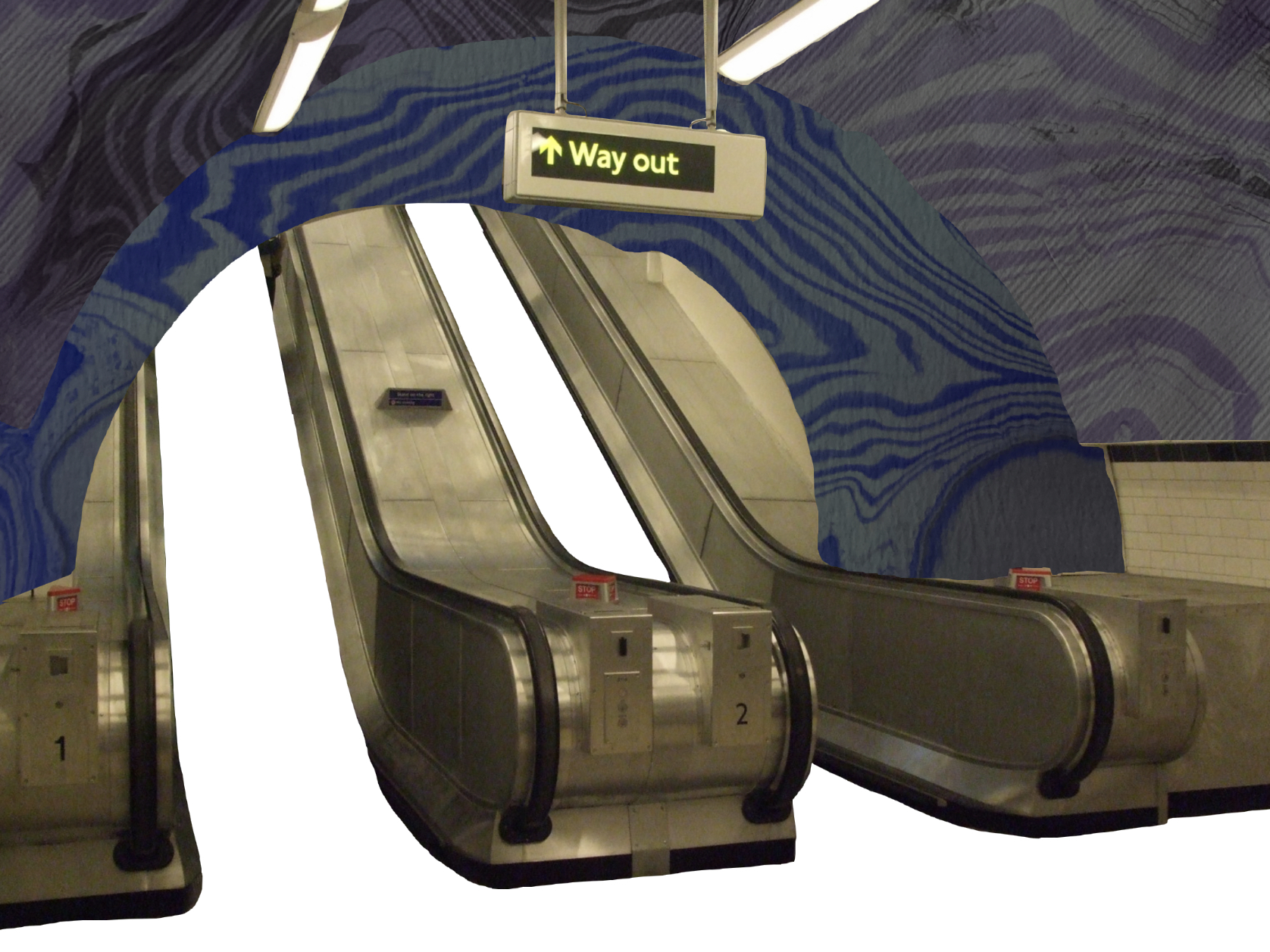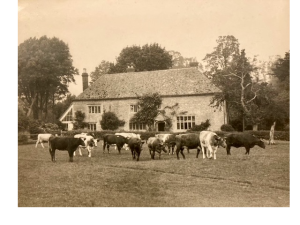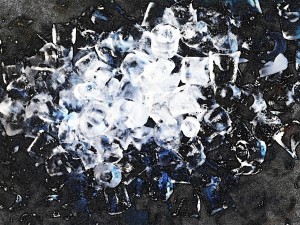
For a Mourner
by Rachel Dastgir | May 20, 2022
If I’m in the right frame of mind, I can still picture the old Whitechapel. Back then, there were no sleek walkways as there are now, and the current, chic, steel arches were made of sandstone brick, darkened by soot and grime. My father lived in the area from when I was seventeen to twenty-four, and in that period, I passed through so many times that I can still conjure up the rattling of the shuttering barriers. I would come via the District line from South Ken, near my mother’s flat, and tick through the stations with the mechanical ease of a daughter well-versed in the London tube. But though I kept careful control of the commute, the possibility of disaster was never far and even now I am filled with wet horror at the idea of signal failures, delays and skipped stations.
He used my visits as an opportunity to pitch to me a life that I did not want, one working in HR and married to a nice girl and living in Shadwell, in one of those new-build flats. I had my eye on something a little more glamorous. As it happens, I did end up marrying a nice girl and did briefly live in a flat in Bethnal Green, but at twenty, I was certain that my father did not know me as well as he thought he did, and so I sewed my life together with an iron thread that strained under the effort of disproving him. It was quite the athletic task, and I couldn’t always manage it, like that time he got me to go to gymnastics. It was there that I learnt the skill of the cartwheel, which turned out to be very useful: when I was thirty-two, I did one for a girl at a party, who was so impressed that within the hour, in the dark so that I couldn’t see her face, I felt her mouth on mine. I married her a few years later.
It was a nice wedding – the kind I always wanted and felt that I deserved. But, at the reception, my father pointedly dropped a cigarette in George’s glass of Campari, outraged by my old flatmate’s lightly shocking speech. Looking back, I suspect it was not the content of the speech that was offensive to my father, but the speaker. They did not like each other, perhaps because of their similarity. They were both mild and good-looking and had a pair of wide wrists that shifted the curve of a cuff. And both of them had a kind of brevity, which made my father seem very stoic, and George very aloof. In the years I knew him best, George was unable to leave a party empty-handed. But while I envied his easy appeal, I always cleared the flat before the girls emerged, unwilling, or perhaps unable, to see what happened behind the curtain. The first time Alice slept over, walking out of my room un-showered and pale and thick-armed, George was already sitting at the table, a small pot of coffee in front of him. Knowingly, he smiled at me, wide and white.
A few weeks later, she lent me a book that he wanted to read. I gave it to him unthinkingly. Leaving it in his bed one night, after going down to London, dropping by a rave in Epping forest, in a moment of come-down and hangover weakness, he was sick all over it. Then, she lent me an enamel colander, and he warped it by leaving it on the hob. And when she lent me nail polish, he managed to smash it across the grout. And the lipstick, squashed. And the duvet cover, torn as by an animal in the night. Two weeks later, when I banged down his door and wanted back the book, he gingerly lifted it up for me to see.
‘Why wouldn’t you replace it?’ I asked.
‘Listen, I am so sorry.’
His room was a tip: matches, mugs, expensive and carelessly kept shirts, a set of Allen keys, several half-used sticks of sandal deodorant. I had always been vaguely irritated by the set-up but looking at him among this curated collection of human things, I was furious. That morning, Alice had left, broken items in hand. He and I had it out. I blamed him for Alice leaving. I poured out his bottle of Cognac. I even threw my phone at him. He was shocked. No one had ever told him no before. I went back to my room and fell asleep. That night, my mother rang my phone again and again, but it lay smashed in the room next door. Then she rang George who came into my room at 4.47 am, made me put on my jeans and took me down the M25 to the Royal London Hospital. My father had had a heart attack.
I wanted to call Alice, I wanted her there so badly. I wanted to say, I love you, I hate you, I hate that I love you. I saw that in a movie once. Reluctant to steal a line from someone else, I said nothing. By February, my father was back home and recovering and George came to visit me early March. We went along High Holborn, across the Bloomsbury squares and then into Coram Fields, and we sat in the stone-sheltered café, drinking scalding hot chocolate. Inside the wood-chipped playground, he did a little performance for me, running across the swings like Buster Keaton. In the rain, his face was pale and serious, like a little girl’s as she ceremoniously lays the table for tea.
I have always liked that part of town, to the extent that in the years since, I have taken several of the women that I have come to love along that route. They have followed me along the wet pavement, and I have leaned over into the sarcophagus in the basement of the John Soane and peered at their profile. I have bought them tea from the cafés along the Strand and sat with them on the 38 bus back East, and have collected postcards that pile up on my desk. Nowadays, I don’t worry about the studied casualness needed to rope someone in. I earnestly take the tube and look at the commuters, open-faced and unashamed. Folded into my seat, breathing in the damp and animalish air, my mind starts to play tricks on me, placing the faces I want to see onto the faces of strangers. I see my mother in every slight woman with dark hair. I see my father in every small man with dark glasses. And with every tall man who flicks a pair of wide wrists and wears a button-down shirt, I see George.
When my father died, I received a large bunch of flowers from George in the post, along with a bottle of Campari, and I looked out for him at the funeral, though he never showed. Now, a few months later, I’m sorting through my father’s effects. These days, it is a luxurious experience getting off at Whitechapel. The platforms are streaming and elegantly elongated, and the signs are clear and helpful. The benches are well designed, and there’s even a Christmas tree in the steel hall. But I can’t quite understand how they took the old Whitechapel and made the thing they have now. Back then, it didn’t even have a loo. Once, horribly aware of a growing red mark on my trousers, I pushed some commuters out of the way as I stumbled through the train doors. In my ear a man hissed, “Patience is a virtue, love.” It is that station, grotty and strange, that I will always think of. I cannot shake the image of Whitechapel as made from grimy, sandstone brick, just how, when my father developed dementia, no matter how many times I corrected him, he felt sure that I was still twenty. Eventually, I gave up. I give up now. I go through the barrier and swallow the steel and take down the concrete. By the time I reach his flat, I have turned my mind to other things.∎
Words by Rachel Dastgir. Art by Violet Trevelyan-Clark.




